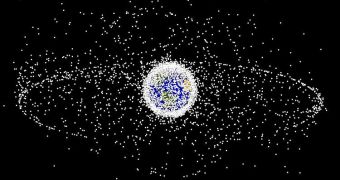According to a recent news report from the South China Morning Post, it would appear that the Japan Aerospace Exploration Agency (JAXA) is very interested in developing methods of cleaning Earth's orbits of the space debris and junk that clutter it today.
The latest effort from JAXA sees the agency partnering up with a fishing equipment manufacturer in Japan, for developing a magnetic space net that would capable of reducing the amount of debris that litter several orbits around the planet.
Debris are dangerous because they can travel at tens of thousands of kilometers per hour. At such enormous speeds, even a fleck of paint is capable of passing through a spacecraft protective shield, such as the one on the International Space Station, without even slowing down.
At this point, the situation is still manageable. Spacecraft can still launch safely into space, although some extra planning and attention is required to navigate the vehicles safely through dangerous orbits.
However, with every new launch, the space debris field around Earth gets increasingly larger. Without a way to reduce this clutter, rockets may have to stay on the ground due to safety concerns within just a few years or decades. Experts say that it will be cheaper to just develop a way to clean the orbits.
JAXA is already making significant progress with its magnetic net. The first tests of a scale model of the instrument are scheduled to be conducted this February. Researchers at the Kagawa University have already completed the net, which will be tested in space following a rocket launch late next month.
The test satellite will deploy a 3,000-meter (9,900-foot) wire behind it once it reaches space. This wire will then begin to generate a strong magnetic field, which researchers hope will attract at least some of the space debris materials along the spacecraft's path.
According to official statistics, there are nearly 100 million pieces of junk orbiting Earth. Around 22,000 of those are larger than 10 centimeters (around 4 inch). Most of this debris is located at altitudes ranging between 700 to 1,000 kilometers (435 to 621 miles) above the surface.
What many people do not know about the dangers of space junk is that a single stray bolt, for example, can cause a devastating cascade effect in Earth's orbit, if it hits a satellite. The ensuing chain reaction could easily take out numerous spacecraft at the altitude band the impact occurred in, and lower.
In such a scenario, it is easy to see how a simple rocket component could destroy our planet's entire communications network, setting us back by a few decades as a civilization. This is why JAXA is fast-tracking its magnetic net, with a full version of the instrument scheduled to be deployed in orbit in 2019.

 14 DAY TRIAL //
14 DAY TRIAL //